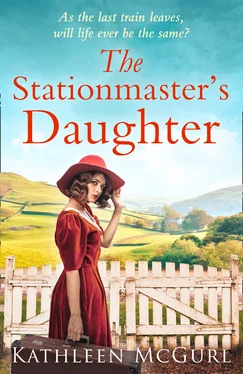‘Cheers, Dad. Did I embarrass myself last night?’
‘Not at all. You cried a lot. I hate to see you like that. But I know what I was like, after your mother …’
He turned away, uncomfortable with the intimate talk. ‘Want me to open your curtains? Or are you going to go back to sleep? You can do whatever you want, you know. No need to get up for ages. I thought – when you do get up – we could go to Lower Berecombe. To the station. I’ll show you what I’ve been spending all my time doing.’ He shuffled towards the door.
‘I’ll be up soon,’ Tilly called after him, as he gently closed the door. Her instinct was just to drink the tea then crawl back under the covers and stay there for the day. But she knew that wouldn’t help.
‘Promise me,’ Jo had said, as she waved Tilly off the day before, ‘that’ll you let your dad help you. Don’t shut him out. Do whatever he suggests, go out with him, look at all his railway stuff. I think it’ll help. You said it helped him, after your mum died. Gave him something to do, something to be interested in.’
She’d nodded at Jo, promising she would, and that meant she’d have to make the effort today to get up and dressed and go out with her dad.
*
It was late morning before Tilly was finally up, showered, dressed, with a fried egg on toast and several cups of coffee inside her, at last feeling ready to face the day. She’d spent a few minutes looking round Ken’s house, seeing everywhere the evidence that he’d not been able to move on at all since her mother’s death. As well as that coat by the front door, her phone still lay on a bedside table, constantly charging although it would never be used again. The smallest of the four bedrooms was still kitted out as her mum’s crafting room – the sewing machine set up and threaded ready for use, scraps of cloth for a patchwork quilt strewn over the bed, a pile of craft magazines with Post-it notes marking interesting pages on the floor.
If he hadn’t managed to move on yet, what hope was there for her?
‘Ready, pet?’ Ken said, from where he was standing by the front door, cap in hand, ready to take her out to his beloved station.
‘Yeah, sure,’ she replied, trying for his sake to summon at least the appearance of enthusiasm.
*
It was just a tumbledown cottage, was Tilly’s first thought, as Ken parked outside Lower Berecombe station house. She climbed out of the car and stood for a moment, looking around. Not much to show for the restoration work, she thought. You could just about see that there’d once been a railway through here – behind the station house was the remains of the trackbed, and a straight, flat footpath led off in one direction, signposted ‘The Old Station Inn – 5 miles’. A couple of sheds stood to the side of the main building. One, looking just big enough for a man to stand up in, looked as though it had once housed signalling equipment.
‘So, this is it,’ Ken said, sounding excited to be showing her around his pride and joy at last. ‘Obviously Lynford’s in better shape but this place is coming along nicely too. Come on in.’
Tilly followed him into the building. Inside the old station was a mess. There was no other way to describe it. Debris everywhere, broken stepladders, ancient pots of paint, mouldering boxes containing who knew what. Ken led her through to a small room that had a hideous orange floral carpet and an old brown velour sofa on which a tabby cat lay curled up, sleeping.
‘Sit down. I’ll put a pot of water on to boil. We can have a cuppa.’ On a rickety-looking table in the corner was a Primus stove, a five-litre container of water, a box of teabags and a couple of chipped mugs. He set to work while Tilly sat down. The cat sniffed at her and then stood, stretched and calmly walked across and onto her lap, where it settled down once again, purring happily. She stroked it, discovering a feeling of calm as she rhythmically smoothed its fur.
‘Ah, you’ve made friends with our resident moggy,’ Ken said, looking over his shoulder at her. ‘We’ve no idea where she came from. She just hangs out here, and any railway volunteer that’s here feeds her.’
He handed her a mug of tea and sat beside her on the old sofa, chattering away about the railway restoration while Tilly drank her tea, stroked the cat and tried to keep herself composed. Ken seemed totally at home there. He’d been an area manager for a railway company before he retired. ‘Glorified stationmaster, essentially,’ he’d always said, with a laugh. Railways must be in his blood, Tilly had realised, for as soon as he’d retired and moved to Dorset he’d involved himself in this railway restoration project.
‘So, bring your tea with you, and I’ll give you a quick tour,’ he said, clearly longing to show off what he’d been up to.
She pushed the cat off her lap and stood up. ‘Is this where you spend all your time, then?’
‘Mostly, yes. This was one of the stations on the line. The Society – the Michelhampton and Coombe Regis Railway Society, that is – bought it a few months ago. It had stood empty for years, after being used as a holiday home back in the Sixties and Seventies. As you can see there’s an awful lot of work to do here. Come on, I’ll show you.’
She followed him out through a set of double doors that led into what had once been a garden. He stopped a couple of feet away from the door. ‘You’re now standing on what was once the “down” platform. It was only ever a low platform – about a foot above the height of the trackbed. See the step down?’ He walked forward and down a muddy step, and Tilly followed. ‘Now we’re on the trackbed. Look that way’ – he gestured to his left – ‘and you can see the footpath that runs along the trackbed from here to Rayne’s Cross and the reservoir. It goes over the old viaduct which has amazing views, so it’s quite a popular walk. And Rayne’s Cross station is now a pub, the Old Station Inn. Lynford is in that direction.’ He pointed to the right where a fence ran across the trackbed and there was no footpath.
Tilly turned and looked back at the station house. There were missing roof tiles, the brickwork looked in need of re-pointing, the paintwork was horribly peeling, and the remains of the platforms and trackbed were muddy and overgrown. It looked the way she felt, she thought, feeling a weird kind of empathy with the building.
‘Why don’t the trains run all the way from Lynford to here?’ she asked.
Ken pulled a face. ‘We’d love to do that, but we’ve had to buy back the trackbed from local farmers, bit by bit. Unfortunately, we’ve been having trouble buying that last piece of the trackbed. Owner won’t sell up.’ He pointed once again to the fence.
‘Why not?’
Ken shrugged. ‘Who knows? She’s got some sort of long-standing grudge against us but no one really knows what it is. Anyway. Come on, come and see my workshed.’ He walked along the old trackbed to just past the station house. Tucked in behind was a large metal shed – it looked like a shipping container. The doors at one end stood open, and inside was what Tilly instantly recognised as paradise for her father. There was a workbench strewn with tools along one side, a couple of rusty railway signals lay on the floor on the other side, and the far end held a large container filled with more rusty metal pieces. Ken picked one up and turned it over, lovingly.
‘This is a track spike. These are used to hold the rail to the wooden sleepers. We’ve acquired thousands of them over the years, and they all need cleaning up before we can use them on a new section of track. And those signals there, those are my next job. Clean them up, get them in working order, repaint them. If we ever manage to buy that bit of land, we’ll be wanting to extend the line to here as soon as possible, and then beyond to Rayne’s Cross. The owner of the pub there can’t wait for us to link up.’
Читать дальше












